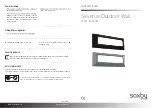
5
Symbols
The following show the symbols used for the equipment.
Be sure that you understand their meaning before use.
• Read instruction manual.
• Only for EU countries Due to the presence
of hazardous components in the equipment,
waste electrical and electronic equipment,
accumulators and batteries may have a
negative impact on the environment and
human health. Do not dispose of electrical
and electronic appliances or batteries with
household waste! In accordance with the
European Directive on waste electrical and
electronic equipment and on accumulators
and batteries and waste accumulators and
batteries, as well as their adaptation to
national law, waste electrical equipment,
batteries and accumulators should be stored
separately and delivered to a separate
collection point for municipal waste, oper-
ating in accordance with the regulations on
environmental protection. This is indicated
by the symbol of the crossed-out wheeled
bin placed on the equipment.
Ni-MH
Li-ion
• Optical Radiation (UV and IR).
Minimize exposure to eyes or skin.
• Do not stare at operating lamp.
• Use appropriate shielding or eyes
protection.
• Take particular care and attention!
IMPORTANT SAFETY
INSTRUCTIONS
WARNING:
When using appliances, basic safety
precautions should always be followed to reduce the risk
of fire, electric shock, and personal injury, including the
following:
READ ALL INSTRUCTIONS.
1. Do not look into the light, or do not expose the light to
eyes. Eyes may be damaged.
2. Do not cover the lamp with cloth or carton, etc.
Otherwise it may cause a flame.
3. Do not expose it to rain or snow. Do not wash it in water.
4. Do not touch the inside of the appliance with tweezers,
metal tools, etc.
5. When the appliance is not in use, always switch off and
remove the battery cartridge from the appliance.
6. Do not give the appliance a shock by dropping, striking,
etc.
7. Safety information for portable luminaires with batteries.
• Battery disposal should be in compliance with your
local regulations that address the disposal of hazardous
materials.
• Do not incinerate the battery.
8. Additional information for luminaires.
• The light source of this luminaire is not replaceable,
when the light source reaches its end of life the whole
luminaire shall be replaced.
9. Battery tool use and care.
• WARNING: Read all safety warnings and instructions.
Failure to follow the warnings and instructions may result
in electric shock, fire and/or serious injury.
• Prevent unintentional starting. Ensure the switch is in the
off-position before connecting to battery pack, picking
up or carrying the appliance. Carrying the appliance with
your finger on the switch or energizing appliance that
have the switch on invites accidents.
• Disconnect the battery pack from the appliance before
making any adjustments, changing accessories, or
storing appliance. Such preventive safety measures
reduce the risk of starting the appliance accidentally.
• Recharge only with the charger specified by the
manufacturer. A charger that is suitable for one type of
battery pack may create a risk of fire when used with
another battery pack.
• Use appliances only with specifically designated battery
packs. Use of any other battery packs may create a risk
of injury and fire.
• When battery pack is not in use, keep it away from other
metal objects, like paper clips, coins, keys, nails, screws
or other small metal objects, that can make a connection
from one terminal to another. Shorting the battery
terminals together may cause burns or a fire.
• Under abusive conditions, liquid may be ejected from
the battery; avoid contact. If contact accidentally occurs,
flush with water. If liquid contacts eyes, additionally seek
medical help. Liquid ejected from the battery may cause
irritation or burns.
• Do not use a battery pack or appliance that is damaged
or modified. Damaged or modified batteries may exhibit
unpredictable behavior resulting in fire, explosion or risk
of injury.
• Do not expose a battery pack or appliance to fire or
excessive temperature. Exposure to fire or temperature
above 130 °C (265 °F) may cause explosion.
• Follow all charging instructions and do not charge the
battery pack or appliance outside of the temperature
range specified in the instructions. Charging improperly
or at temperatures outside of the specified range may
damage the battery and increase the risk of fire.
• Have servicing performed by a qualified repair person
using only identical replacement parts. This will ensure
that the safety of the product is maintained.
• Do not modify or attempt to repair the appliance or the
battery pack except as indicated in the instructions for
use and care.
English






































